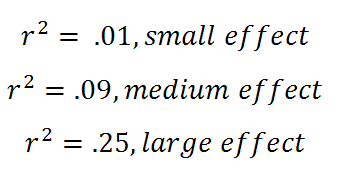Remember that effect size allows us to measure the magnitude of mean differences. This is usually calculated after rejecting the null hypothesis in a statistical test. If the null hypothesis is not rejected, effect size has little meaning.
Let's say we already have this data from a previous t-test:

|
Figure 1. |
|---|
One method of calculating effect size is cohen's d:

|
Figure 2. |
|---|
With cohen's d, remember that:
d = 0.2, small effect
d = 0.5, medium effect
d = 0.8, large effect
So, our d of 1.14 would be a large effect size.
Another method of calculating effect size is with r squared:

|
Figure 3. |
|---|
With r squared:

|
Figure 4. |
|---|
0.59 indicates a very large effect. Our means are likely very different.